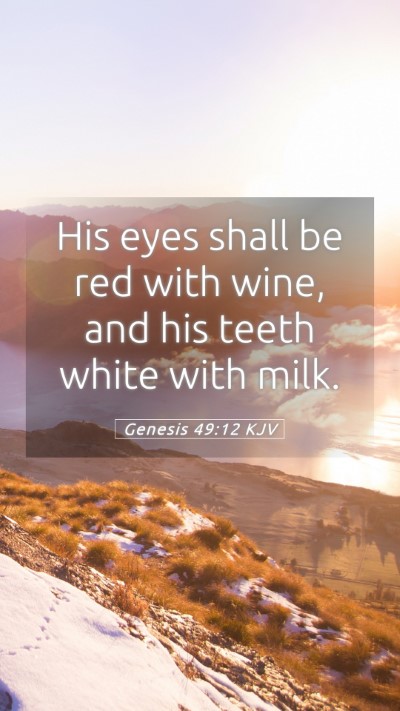Understanding Genesis 49:12
Genesis 49:12 states, "His eyes shall be red with wine, and his teeth white with milk." This verse is part of Jacob's blessing upon his twelve sons, which foreshadows the characteristics and fortunes of the tribes that would descend from them. Here, we will explore the Bible verse meanings, Bible verse interpretations, and the overall significance of this scripture.
Contextual Background
The context of Genesis 49 involves Jacob (Israel) gathering his sons to bless them before his death. Each blessing serves both a personal and prophetic function, outlining the futures of the tribes they represent. Jacob's words are imbued with deep Bible study insights, reflecting the cultural, historical, and spiritual dynamics of ancient Israel.
Verse Translation and Key Terms
Different translations may phrase Genesis 49:12 slightly differently, but the essence remains constant:
- "His eyes shall be red with wine..."
- "...and his teeth white with milk."
Verse Analysis
In this passage, Jacob refers to his son Judah, and the imagery used is rich with symbolic meanings:
- Red Eyes: The mention of "red eyes" is often interpreted as indicative of a joyful and carefree nature, suggestive of prosperity and abundance associated with wine. This can point towards Judah's future as a leading tribe that will be characterized by celebratory feasts and blessings.
- White Teeth: "White teeth" symbolize health, strength, and vitality, further indicating satisfaction and abundance. In biblical literature, milk is often associated with nourishment and the bounty of the land.
Theological Implications
According to Matthew Henry, the imagery in this verse signifies the blessings that Christ would bring through Judah's lineage. Judah, as the tribe from which the Messiah would come, implies a future filled with hope and grandeur.
Albert Barnes adds to this interpretation by emphasizing that the effects of Judah's descendants will resonate through history, celebrating both material and spiritual blessings. He sees this verse as a prophetic declaration of the bloodline leading to David and ultimately Christ.
Adam Clarke further elucidates that the colors red and white may symbolize contrasting states of being—joyful celebration versus purity and strength—indicating a balanced life imbued with the blessings of God.
Cross References
This verse relates to various other scriptures, enhancing its meaning and interpretation:
- Genesis 38:29-30: The birth of Perez and Zerah symbolizes rivalry and distinct futures, reflecting Judah's lineage.
- Hebrews 7:14: Affirms the priestly order of Jesus Christ coming from the tribe of Judah.
- Revelation 5:5: Speaks of Jesus as the "Lion of the tribe of Judah," connecting back to this prophetic word.
Applications for Daily Life
This verse provides guidance on how to live a life of abundance and balance. It encourages believers to embrace joy and nourishment from God's blessings while leading a life that reflects purity and strength. The Bible verse explanations remind us that an understanding of our heritage in faith can fortify our lives today.
Conclusion
Genesis 49:12 serves as a timeless reminder of God's blessings upon those who walk in faith. Engaging with this verse through Bible study resources and Bible commentary enriches our understanding of scripture, confirming how God’s promise spans generations.


